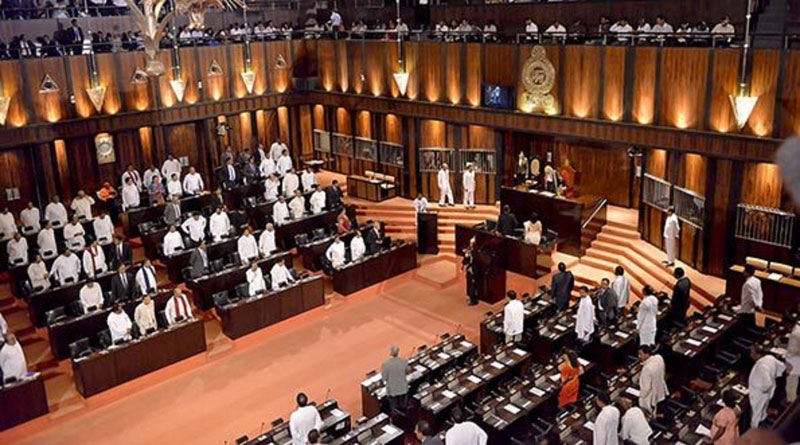
Sri Lanka's parliament was thrown into chaos on November 14 after a no confidence motion against new Prime Minister Mahinda Rajapakse was presented to Speaker Karu Jayasuriya, which prompted the parliament to be adjourned till November 15.

(Illustrative Image).
A meeting inside the Sri Lankan Parliament.
Following the parliament's adjournment, legislators made
contradictory claims of the results of the no confidence vote.
The no confidence motion on
the new prime minister and the newly elected government was presented by
Janatha Vimukthi Peramuna (JVP) legislator Anura Kumara Dissanayaka and
seconded by JVP legislator Vijitha Herath.
However, when the motion was
taken up for a vote, legislators from Rajapakse's party broke out in protest,
prompting the prime minister to leave the floor of the House.
Lakshman Kiriella, legislator
from the United National Party led by sacked Prime Minister Ranil
Wickremesinghe, told journalists following the adjournment that the no
confidence vote had been passed with a majority and the new prime minister and
government would cease to exist.
"We have the majority
and the proper parliamentary procedures were followed. The new government is no
more. Prime Minister Ranil Wickremesinghe will once again be the prime minister
of the nation," Kiriella said.
However, Sri Lanka Podujana
Peramuna legislator Dinesh Gunawardena said the vote had not been passed as the
parliament speaker had not followed normal parliamentary traditions by calling
for an electronic vote.
Sri Lanka has been embroiled
in a political turmoil since October 26, when President Maithripala Sirisena
surprisingly sacked his prime minister Wickremesinghe and appointed former
president Rajapakse to the post.
Sirisena who was supposed to address the parliament on
November 14 remained absent.
Source: NDO
Many countries are grappling with rapidly aging population. As population aging becomes an irreversible global trend with significant impacts on economic and social sectors, nations face the urgent task of creating flexible policies to adapt to and make the most of this trend to build prosperous and sustainable societies.
With a series of stimulus measures, the world tourism industry is on the way to recovery as before the COVID-19 pandemic broke out. Facing the opportunity to take off, the "smokeless industry” is expected to strongly contribute to global economic growth while promoting potential and cohesion, contributing to peace and sustainable development.
The danger from the COVID-19 pandemic is still latent, threatening people’s health and lives in the context that the immunity provided from the COVID-19 vaccine has decreased. Many other dangerous diseases are also likely to break out when the global vaccination rate slows down, due to inequality in access to health services, vaccine hesitancy, and consequences of economic recession.
The Association of Southeast Asian Nations (ASEAN) is witnessing a rise in the sales of electric vehicles (EVs) in Vietnam, Malaysia and Indonesia, according to Maybank Investment Bank Research (Maybank IB Research).
The respect paying ceremony for Party General Secretary Nguyen Phu Trong continued on the morning of July 26 at the National Funeral Hall in Hanoi, with high-level delegations from foreign countries and international organisations paying their last respects and expressing deep condolences.
A wave of condolences have poured in from world leaders, international organisations, rulling parties, Communist parties and partner parties following the death of Vietnamese Party General Secretary Nguyen Phu Trong.



